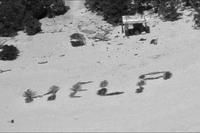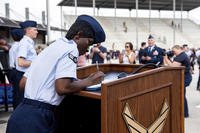Defense Secretary Jim Mattis again pushed a diplomacy first response to North Korea's ICBM threat Friday, despite the initial reluctance of China and Russia to back the U.S. on pressuring the Kim Jong-un regime.
At the Pentagon, when asked if he expected more tests of a missile that could hit the U.S., Mattis said that "as far as another test in future, you'll have to ask people in Pyongyang about that. However, this is a diplomatically-led international effort to stop a worldwide threat that they are bringing to bear."
"So it is led by diplomacy right now. There are United Nations efforts under way, as you're aware," Mattis said, although China and Russia earlier this week blocked the effort by U.N. Ambassador Nikki Haley to condemn the test firing on Tuesday of an ICBM prototype and impose additional sanctions.
In Hamburg, Germany, where he was attending the G-20 nations economic summit, Trump met on the sidelines with South Korean President Moon Jae-in and Japanese Prime Minister Shinzo Abe on the growing threat from Kim Jong-un's nuclear programs and missile tests to develop an Intercontinental Ballistic Missile capable of carrying a nuclear warhead.
They later issued a statement saying they would "never accept" a North Korean regime armed with nuclear weapons and said they would continue to press "for early adoption" by the UN of additional sanctions on North Korea.
Moon has frustrated the U.S. by refusing to approve the deployment of a full battery of the Terminal High Altitude Area Defense (THAAD) anti-missile system south of Seoul pending an environmental study. Only two of six of the THAAD launchers are now in place.
However, Reuters reported Friday that the U.S. now has approval to carry out a test in the coming days of the two THAAD launchers against an intermediate-range missile threat.
At the UN on Friday, the agenda was taken up by a vote on a treaty to ban nuclear weapons, which found the U.S. and North Korea in rare alignment. The U.S., North Korea and other nations with nuclear weapons boycotted the vote by the UN Conference to Negotiate a Legally Binding Instrument to Prohibit Nuclear Weapons.
To loud applause, Costa Rican Ambassador Elayne Whyte Gomez, the president of the Conference, announced the results -- 122 nations in favor, the Netherlands opposed and Singapore abstaining. "We have managed to sow the first seeds of a world free of nuclear weapons," Whyte Gomez said.
None of the nine countries known or believed to possess nuclear weapons -- the U.S., Russia, Britain, China, France, India, Pakistan, North Korea and Israel -- supported the treaty. Israel's long-standing position is that it will neither confirm nor deny that it has nuclear weapons.
In a statement, Haley joined with the ambassadors of Britain and France in explaining their decision to boycott the vote. They said the treaty "clearly disregards the realities of the international security environment" and "is incompatible with the policy of nuclear deterrence, which has been essential to keeping the peace in Europe and North Asia for over 70 years."
The treaty also did not take into account "the grave threat posed by North Korea's nuclear program, nor does it address other security challenges that make nuclear deterrence necessary," the three ambassadors said.
Mattis stressed diplomacy at a Pentagon meeting with British Secretary of State for Defense Sir Michael Fallon. He said it was too early to assess whether a dummy warhead atop the North Korean missile launched Tuesday had survived re=entry into the atmosphere, which would be a major milestone for the program.
"We're still analyzing the latest tests at this time, so I don't want to speculate or mislead you at this point," Mattis said. "Obviously, they are continuing to mature a threat in violation of the United Nations, and that's the way we look at it. But right now, I can't give you a specific on that."
On Thursday, Mattis told Pentagon reporters that "I do not believe this (ICBM) capability in itself brings us close to war because the President's been very clear, and the Secretary of State's been very clear, that we are leading with diplomatic and economic efforts."
"However, the military remains ready in accordance with our alliance with Japan, with Korea,"Mattis said. "We stand ready to provide options if they are necessary."
-- Richard Sisk can be reached at richard.sisk@military.com
Related Video:
North Korea ICBM Launch



























